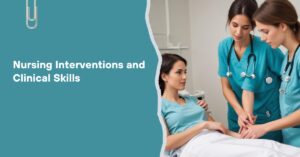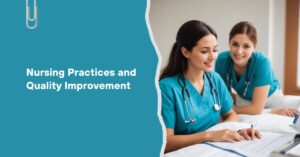Health care is a broad field that is continually evolving, and nurses have a high responsibility to provide quality patient care. To be at the top of their careers and to offer best practices based on thorough research, nurses need to be involved in scholarly writing and research activities. Conducting library research is an essential part of professional practice and a way of providing oneself with a chance to learn more, understand strategies, and apply the knowledge obtained to practice.
That is why access to a large number of research sources helps a nurse extend knowledge beyond medical sciences and treatment possibilities of different illnesses and outcomes. Specifically, through this exposure to libraries, nurses develop mastery of findings published by other professionals and thus serve society by improving clinical competencies and advancing growth in healthcare provision for people.
Challenges nurses face in accessing and utilizing research resources
Table of Contents
ToggleAs the use of library research can have many advantages, nurses face numerous issues when it comes to both the availability and use of the resources. These need to be more motivated due to short time due to tight schedules at their places of work, lack of familiarity with the research databases, and complexities involved in accessing these libraries.
Further, the existing literature is also immense, which makes it easier for nurses to look for potential and reliable articles. In addition, the limited budget and access to institutional facilities may create additional barriers, resulting in more difficulties in gaining access to premium materials for research. In this article, we discuss the problems that nurses face in library research and explore its importance.
Library Basics
Before proceeding to use the library, it is important to know how to use the library’s sites and databases, as this allows for achieving the best results.
Explore Library Websites
Make use of the search options to filter the search results by applying specific parameters like the date of publication, author, or topic of the article. Features explored by many libraries are subject guides that include resource lists created by librarians for users interested in specific topics or fields. These guides may contain tips on which databases to consult and which journals and books might be relevant to your research project. Make sure to get to know some of the library’s available database interfaces, which give access to various research content.
Types of Research Databases
- PubMed: Medline is a journal database produced under the supervision of the National Libraries of Medicine, and it contains articles from biomedical literature, other life science journals, and electronic books from publishers.
- CINAHL (Cumulative Index to Nursing and Allied Health Literature): Designed to serve the specific needs of nursing and allied health care professionals, CINAHL hosts an extensive body of nursing literature in journals, books, proceedings, dissertations, and other research evidence.
- Scopus: A multidisciplinary battery of databases, Scopus provides a broader subject area that comprehensively covers scientific and scholarly publications in all disciplines, such as sciences, technology, medicine, social sciences, arts, and humanities.
Library’s Physical Resources
In the digital era, remember the wealth of physical resources because we know that physical research is effective, and we learn more from it.
- We can check out books and other material in the library, print journals, and other documents that are for loan from the library or consultation within the library.
- In case a certain book or reference is not in the library’s collection, the other means that can be used to access it include interlibrary loan services that enable the user to request materials within a certain network of libraries.
- As much as we have helpful printed indexes, online databases, and subject-specific resources, librarians are a valuable asset when it comes to your work in research. Refrain from asking for help in searching for literature, guidance in the use of the University’s databases, and assistance with citation, among other concerns.
You can also read Quick and Easy Library Research Tips for Busy Nurses
Best Library Practices for Nurses
Organizing Research Materials Effectively
Collection organization is deemed relevant and necessary for nurses to help them find the required sources quickly and make proper management of their research. One helpful technique is to set various standards for filing and organizing research sources. This could mean categorizing files in folders pertaining to a particular course or topic or arranging physical paper-based articles and documents in physical folders. An orderly method of filing information also enables the nurses to find information that will be useful to them in doing their work without having to carry out comprehensive and time-consuming searches.
Use of Citation Management Tools for Reference
Citation management tools facilitate referencing and citations to assist nurses when undertaking research and writing projects.
- Zotero
- Mendeley
- Endnote
Those are some of the tools that can help the nurse store references in a local base and organize them in a well-ordered way. This is true because citation management tools can import citation data from databases, websites, and PDFs, thus saving time and effort in making citation entries manually and decreasing the likelihood of errors.
Authorize Nurses as Researchers
The nursing profession dramatically contributes to the improvement of healthcare through research. The following outline explores the importance of recognizing their contribution to enhance nurses’ roles as researchers. It emphasizes evidence-based practice for nursing and discusses the responsibility that nurses take to encourage the use of research projects to enhance patient care. It explores knowledge translation strategies for nurses to use the findings of research to improve quality care delivery in healthcare facilities.
Strategies
- Developing Research Skills: Arranging expertise and informative courses to improve the ability of the nurses in the field of research, such as creating this study, collecting data, or analyzing them.
- Collaborating with Interdisciplinary Teams: To encourage nurses to work together with researchers belonging to different backgrounds so that they use different perspectives and knowledge in nursing research activities.
- Seeking Mentorship and Guidance: Creating positive and healthy working relationships between the senior investigators and the inexperienced beginner nurses to coach, encourage, and guide them in the right direction in case they have to carry out research.
Overcome Challenges:
- Time Constraints: For the practical purpose of this paper, presenting feasible approaches that can be taken by the nurses so that they can relate research activities to their heavy clinical day-to-day working schedule.
- Access to Resources: Promoting collaborating centres and grants that assist nurses in obtaining funds and facilities as well as receiving mentorship.
- Institutional Barriers: Promoting nursing research through seeking funding from institutions, challenging nursing research staff and students to seek acknowledgement and support of their research from institutions through research centers, and other forms of health system support for nursing research.
Library Hacks Every Nurse Should Master
Choosing the right materials can be quite challenging when a nurse appears in the library with a large number of books, journals, and other sources, but the following hacks will help him or her easily narrow down the list of potential sources.
Tips for Finding Relevant Research Articles Quickly
Learn methods to find the best articles within a short time for the enhancement of nursing practice.
- Utilize Database Filters: Utilities such as date, type of study, or other specific filters will help you filter your results according to the publication date and other relevant parameters.
- Explore Subject-Specific Guides: Look up the guides provided by the librarians for subjects related to nursing to find lists of sources aligned with the mentioned topics.
- Leverage Citation Chaining: Continue the analysis of the bibliographic references by going back and forth from the article chosen as the anchor, seeking more related studies.
Maximizing the Effectiveness of Keyword Searches
Take special care when using keyword searches to retrieve the specific information you want.
- Choose Specific Keywords: Avoid general keywords and use specific keywords that refine searches and direct users to appropriate literature.
- Experiment with Synonyms and Related Terms: To improve your results, include not only the exact words you are searching for but also their close variations in your keywords.
- Utilize Boolean Operators: Express keywords using Boolean operators (AND, OR, NOT) to search for information that is relevant in a more elaborate manner to give more accurate results.
Utilizing Advanced Search Features to Refine Results
- Harness Field-Specific Searches: Use field codes in your search to focus on key terms that appear in specific fields like title, abstract, or author affiliation.
- Explore Subject Headings: Search under the indexing and abstracting terms provided for the articles to identify the literature that is related to the topic.
- Save Search Alerts: Use them to establish an e-mail alert that notifies you when new articles related to the entered parameters are placed in the database, thus helping you to get more recent articles of interest.
Applying Theory to Generate Knowledge Efficiently
Familiarity with and use of theoretical frameworks in nursing research is crucial in terms of nurturing knowledge.
Theoretical Frameworks in Nursing Research
- Nursing Theories: Examine critical concepts of well-developed theories, including the System Theory, the Self-Care Theory, and the Health Promotion Model, to establish the relationships between the concepts and modern nursing practice research.
- Interdisciplinary Perspectives: It is essential to think from perspectives of related disciplines like psychology, sociology, and anthropology to provide a deeper understanding of nursing phenomena and maximize the analytic depth of your work.
Practical Methods for Applying Theory to Research Projects
- Conceptual Frameworks: Stay focused on defining logical models that suggest connections between theoretical concepts and research variables. This will outline the methodology of your investigation and a way to analyze the obtained results.
- Operationalization of Constructs: Translate concepts in the theories into variables and the measures on which the data would be collected so as to close the gap between theoretical models of work and actual empirical studies.
- Triangulation of Methods: Use not only questionnaires but also interviews and observations, as a variety of approaches can significantly increase the reliability of the results obtained.
Theoretical Application
- Literature Review: Work through major sources of literature in the area under study and be guided by the theoretical concepts developed to come up with research questions and hypotheses, as well as gaps that can be filled.
- Data Analysis and Interpretation: Understand how to use the concepts derived from the mentioned theoretical frameworks to analyze the findings, contributing to the enhanced qualitative level of your research by uncovering patterns, trends, and relationships that may otherwise remain overlooked.
- Knowledge Translation: Where appropriate and as most relevant to the nursing discipline, translate research findings into practical recommendations for implementation as well as into appropriate evidence-based interventional strategies, which can also spur advancement in theory, practice, and nursing education.
Can nurses conduct research independently?
It is absolutely correct to say that nurses can independently perform research. Whereas in the past, nursing studies largely involved other healthcare workers or all the research associates, current times point out that there are more self-employed nurses. Due to the exposure to academia, training, and experience acquired by nurses, they are capable of making, executing, and evaluating research on their own.
Nursing research helps nurses to learn what they find exciting or necessary in the field, and it has revealed helpful information to fill the knowledge gap in the health field. In general, nurses can conduct studies in many contexts of practice, which includes the clinical field, University, clinic, and other community organizations, with regard to several areas of interest like patient, population, health, illness, and several models of health care.
Conclusion
Library research skills are critical for a nurse’s professional development. This final section of the paper will enumerate and discuss relevant library research hacks that nurses should use and remind them of the significance of leaning on library resources as they forge ahead in the healthcare profession.






